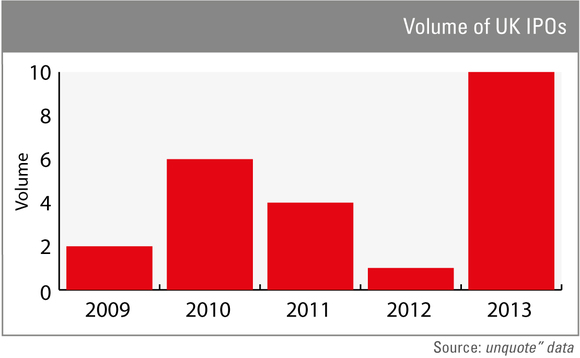
Mid-market players fear UK IPO disaster

The recent flurry of activity in the UK IPO market is a serious cause for concern, according to mid-market players speaking at an industry conference hosted by the London Business School on Friday. Amy King reports
"The UK IPO market is on course for a bust," said one mid-market player speaking at the London Business School's private equity and venture capital conference, held under Chatham House rule on 7 March. "There's a wall of money and advisory intent that is going to float a significant raft of companies at the most fantastic multiples. These companies, which are sometimes quite small with fairly low profits, are floating at stratospheric prices with owners taking a significant amount of cash off the table. It's a disaster waiting to happen and a lot of investors will lose a fair amount of money."
In 2013, the volume of private-equity backed flotations in the UK increased tenfold compared to the previous year, according to unquote" data. But that spike in interest was nothing compared to the soaring value of last year's ten private equity-backed flotations, which pulled in 158 times the amount recorded in 2012. And with six IPOs already recorded this year before the close of the first quarter, last year's flood is expected to pale in comparison to 2014. From Pets at Home to Poundland, large retailers are proving particularly popular. But how long will this flurry continue?
"I think the IPO market is going to be open for a fairly long time, which is very different to what we have seen in the past. Clearly if we see a couple of private equity-backed assets that fall over fairly quickly then that might deter people," said another mid-market investor. "There is a massive wall of money held by institutional investors that want to get into the equity markets. I think unless the IPO market destroys itself by poor performance, it will be here for a longer period of time than I can remember."
But for other mid-market professionals, the end is nigh: "There will almost certainly be people who lost money in IPOs where the sellers are private equity funds. What's happened in the past is that everybody then gets lumped together and at that point all private equity flotations will be deemed to be highly risky and ones to avoid. Of course if you're a smart investor that will be an opportunity." Said another panellist: "Markets very rarely calm down sensibly; they tend to move drastically."
Game changer
Whatever its longevity, the return of IPOs is affecting more than just exit volumes. unquote" data reveals a growing number of GPs floating portfolio companies after a reduced holding period, but retaining a stake in the company. While trade sales or secondary buyouts may traditionally have been sought after a period of around five years, GPs are both returning cash earlier and keeping skin in the game for longer.
Sun European Partners' flotation of UK-based women's clothing Bonmarché is one such example. The GP bought the firm for £10m from parent company Peacock Group in January 2012, according to unquote" data. Following its acquisition, Sun followed a turnaround strategy for the business, closing a number of Bonmarché's unprofitable stores (a third of all outlets) and negotiating a reduction in rental for the remaining property leases. In November 2013, the firm listed on the AIM with a market cap of £100m, with Sun selling a 40% stake in a partial exit from the company.
As a result, several players are now entering buyout negotiations with a management team with this extended partnership in mind. The possibility of offloading a certain stake but maintaining a long-term partnership afforded by the IPO is changing the course of negotiations. "We're seeing private equity firms exiting businesses via the IPO market earlier than they would have traditionally exited, and they're taking 40-50% of their money off the table. Instead of taking a 3-4 year perspective on this business, they're saying let's take an eight-year perspective through the equity markets. It does change a very black-and-white discussion with management," said a mid-market player. "And if you stick with a business you know, that is a very different risk profile."
Latest News
Stonehage Fleming raises USD 130m for largest fund to date, eyes 2024 programme
Multi-family office has seen strong appetite, with investor base growing since 2016 to more than 90 family offices, Meiping Yap told Unquote
Permira to take Ergomed private for GBP 703m
Sponsor deploys Permira VIII to ride new wave of take-privates; Blackstone commits GBP 200m in financing for UK-based CRO
Partners Group to release IMs for Civica sale in mid-September
Sponsor acquired the public software group in July 2017 via the same-year vintage Partners Group Global Value 2017
Change of mind: Sponsors take to de-listing their own assets
EQT and Cinven seen as bellweather for funds to reassess options for listed assets trading underwater







